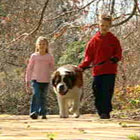St. Bernard
Breed: St. Bernard
Temperament: energetic and protective
Lifespan: 6-10 years
Maintenance: medium
Recommended for: active people with loads of space
History and habitat
St Bernards were said to have been used as companion and guard dogs for Swiss monks who maintained hospices near the border of Switzerland and Italy. The breed is actually named after Saint Bernard, a Swiss monk who supposedly built one of these hospices in the 10th century. Over time, this dog was found to demonstrate skills at saving lives and rescuing people lost in the snow. To this day, St Bernards are used as official rescue dogs by many countries.
Appearance
The St Bernard is a big dog, standing between 65-90cm (2′-3′). They weigh 70-90kg (154-209lb). Known as a ‘massive’ breed, they are muscular with a powerful appearance and large, imposing heads. Originally bred with a smooth coat, a rough-coated variety is now available. This rough variety has longer hair around the neck, thigh and tail while the smooth variety is sleek. Coat colours range from orange to mahogany, brindle and red-brindle. All St. Bernards should have a black face with white facial blaze, collar, chest and forelegs. There are three types of markings – white splash, mantle and torn patches; each describing the amount of white and brown covering the dog.
Temperament
St. Bernards require obedience training from an early age. They’re a very strong dog and can weigh up to 80 kg by 18 months. Therefore it is important to ensure that the dog understands who is boss. Breeders say the dogs can be frightening to some because of their size and as such need to be under effective control at all times. St. Bernards make excellent watchdogs.
Health and lifespan
Massive dogs such as these are prone to arthritic conditions, particularly as a result of hip and elbow dysplasia. Breeders say there have been recent dramatic improvement in the breeding standards, however it is always incumbent upon any prospective owner to ensure they are buying a pup from breeders with certificates clearing their dogs of these conditions. Arthritis is hard to avoid in large breeds, however hip and elbow dysplasia can be avoided if breeding stock is properly screened. As with most of the giant breeds, St.Bernards are also intolerant of heat. Their large body mass and heavy coat makes the breed particularly prone to heat stress. Large breeds such as this are also relatively short lived – about six-10 years maximum.
Maintenance and feeding
Smooth coats need about 10 minutes weekly. Rough coats require a daily brush, especially to ensure no hair is matted behind the ears, the back legs or tail. Owning a St. Bernard means you need a fair tolerance to slobber too and they can be a messy dog when eating. This breed in particular is relatively expensive to feed. About $20-$30 per week.
Breeding
Due to the size of the pup’s large heads, bitches can have problems giving birth (whelping). Breeders recommend having a vet on standby. The average litter size is six to eight.
Space
These dogs require big backyards, high fences and, if you’re going to travel with your dog, you might want to rethink that little sports car.
Recommended for
Big breed lovers. Active people and families with older children. Although the St Bernard was originally bred to cope with the extreme winters of the Swiss Alps they will adjust to our Australian conditions. It is important to always supply plenty of water and shade and never run them in the heat of the day.
If you don’t like a little bit of slobber or a bit of hair, then Saints probably aren’t for you. But if you love loyal companionship and have plenty of space, the St. Bernard could be your breed. Saints can be a intimidating breed especially for smaller children and remember obedience training is essential.
National contacts
To find up-to-date contacts for breeders, contact the following organisations.
Dogs NSW
http://www.dogsnsw.org.au/breeders-directory
Email: [email protected]
Phone: 1300 728 022 (NSW only) or (02) 9834 3022
Fax: (02) 9834 3872
Dogs Victoria
http://www.vca.org.au
Email: [email protected]
Phone: (03) 9788 2500
Fax: (03) 9788 2599
Dogs ACT
http://www.actca.asn.au
Email: [email protected]
Phone: (02) 6241 4404 – Fax: (02) 6241 1129.
Dogs West
http://www.cawa.asn.au
Email: [email protected]
Phone: (08) 9455 1188
Fax: (08) 9455 1190
Dogs SA
http://dogssa.com.au
Phone: (08) 8349 4797
Canine Control Council of Queensland
http://www.cccq.org.au
Email: [email protected]
Phone: (07) 3252 2661
Fax: (07) 3252 3864
Tasmanian Canine Association
http://www.tasdogs.com
Email: [email protected]
Phone: (03) 6272 9443
Fax: (03) 6273 0844
Dogs NT
http://www.territorydogworld.com
Email: [email protected]
Phone: (08) 8984 3570
Fax: (08) 8984 3409



